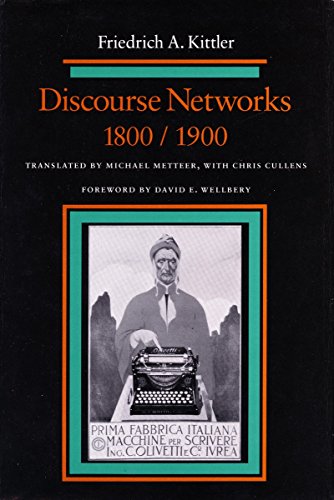Artículos relacionados a Discourse Networks, 1800/1900

Críticas:
'I have read Discourse Networkd, 1800/1900 with keen intellectual pleasure. It is the product of exhaustive archival research, audacious argument, and epigrammatic brilliance - a new and encyclopedic vision of modern German literary, intellectual, and social history, achieved through the optic of discourse analysis, psychoanalysis, and semiotic theory, analyzed in a spirit of playfulness and impudent precision.'Stanley Corngold, Princeton University
Reseña del editor:
This is a highly original book about the connections between historical moment, social structure, technology, communication systems, and what is said and thought using these systems - notably literature. The author focuses on the differences between 'discourse networks' in 1800 and in 1900, in the process developing a new analysis of the shift from romanticism to modernism. The work might be classified as a German equivalent to the New Historicism that is currently of great interest among American literary scholars, both in the intellectual influences to which Kittler responds and in his concern to ground literature in the most concrete details of historical reality. The artful structure of the book begins with Goethe's Faust and ends with Valery's Faust. In the 1800 section, the author discusses how language was learned, the emergence of the modern university, the associated beginning of the interpretation of contemporary literature, and the canonization of literature. Among the writers and works Kittler analyzes in addition to Goethe's Faust are Schlegel, Hegel, E. T. A. Hoffman's 'The Golden Pot', and Goethe's Tasso. The 1900 section argues that the new discourse network in which literature is situated in the modern period is characterized by new technological media - film, the photograph, and the typewritten page - and the crisis that these caused for literary production. Along the way, the author discusses the work of Nietzsche, Gertrude Stein, Mallarme, Bram Stroker, the Surrealists, Rilke, Kafka, and Freud, among others.<
"Sobre este título" puede pertenecer a otra edición de este libro.
- EditorialStanford University Press
- Año de publicación1990
- ISBN 10 0804716161
- ISBN 13 9780804716161
- EncuadernaciónTapa dura
- Número de páginas493
- Valoración
Comprar nuevo
Ver este artículo
EUR 228,08
Gastos de envío:
EUR 3,98
A Estados Unidos de America
Los mejores resultados en AbeBooks
Discourse Networks 1800/1900
Publicado por
Stanford University Press
(1990)
ISBN 10: 0804716161
ISBN 13: 9780804716161
Nuevo
Tapa dura
Cantidad disponible: 1
Librería:
Valoración
Descripción Hardcover. Condición: new. New Copy. Customer Service Guaranteed. Nº de ref. del artículo: think0804716161
Comprar nuevo
EUR 228,08
Convertir moneda
Discourse Networks 1800/1900
Publicado por
Stanford University Press
(1990)
ISBN 10: 0804716161
ISBN 13: 9780804716161
Nuevo
Tapa dura
Cantidad disponible: 1
Librería:
Valoración
Descripción Hardcover. Condición: new. New. Nº de ref. del artículo: Wizard0804716161
Comprar nuevo
EUR 234,20
Convertir moneda

